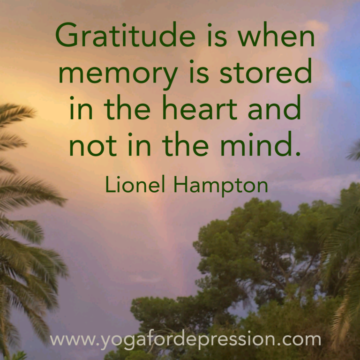“I have found the LFYP training to be incredibly useful in giving people specific tools to use in maintaining physical, mental, emotional, and spiritual balance, and further opening their intuitive abilities.” — Nancy Windheart, RYT-200, LFYP, Reiki Master, Animal communication teacher, Prescott, AZ
“Words do not do justice to all that I learned. This workshop changed my life!” — Jen Nolan, Teacher, Cortland, NY
“I feel profoundly transformed, both physically and emotionally. The connection between mind, body and spirit was clearly evident to me, but revealed to me through this workshop as an integrally vital link to overall health.” — Nadine Richardson, program manager at rehab agency, Monroe, CT
“I began a fantasy during the meditation exercise... almost as if I’d been there. It’s now an on-going work of fiction.” — Serian Strauss, Tanzania
“Yoga Skills for Therapists is the ideal resource for those who want to bring yoga practices into psychotherapy or healthcare. Weintraub, a leader in the field of yoga therapy, offers evidence-based, easy-to-introduce strategies for managing anxiety, improving mood, and relieving suffering. Helpful clinical insights and case examples emphasize safety, trust, and skillful adaptation to the individual, making it easy to apply the wisdom of yoga effectively in the therapeutic context.” — Kelly McGonigal, PhD, author, Yoga for Pain Relief, Editor-in-Chief, International Journal of Yoga Therapy
I absolutely love this stuff! I have been using it with my clients and I am just finding it to be so incredibly helpful. There seriously something for everything. Although I am not as skilled as I hope to be someday, even at my level of training I’m finding that I am beginning to figure out what to do. It just blows my mind! - Christine Brudnicki, MS, LPC
“I have found the pranayama (breathing practices) especially easy to introduce in a clinical setting. Some people have benefited quickly in unexpected and transformative ways.” — Liz Brenner, LICSW, LFYP, Watertown, MA
“I gained perspective of who I am in the world and this will change my life significantly.” — Mary Ford, artist, Southport, CT
“This program changed my life in a significant way. It helped me connect with the spirit which is something you can’t get from psychotherapy and medication.” – G. W., artist, Pittsburgh, PA
“I gained tools for working with my own depression and with my clients’ depressions.” — Robert Sgona, LCSW, RYT, psychotherapist, Yoga teacher, Camden, ME.
“I have gained a softer heart, more receptive mind, and tools to enrich both personal and professional aspects of my life.” – Regina Trailweaver, LICSW, clinical social worker, Hancock, VT.
“I came hoping to learn to move past some of the obstacles blocking my creativity. Over the course of this weekend, I feel I’ve gained a certain measure of faith in myself and in my ability to change. I also had some realizations that I believe will be very helpful to me. I feel encouraged. Both the content and presentation of this program were so well-thought out that I can’t think of any way to improve it.” — Andrea Gollin, writer & editor, Miami, FL
“I have gained an incredible opening and clearing of old obstructions. I hope to return to my life and fill this opening with things I love to do and that give me joy!” — Lisa Shine, administrative assistant, Ballston Lake, NY
“I utilize the LFY techniques in both a class room setting and one-on-one environment. The skills have infused my teachings with compassion, mindfulness, and awareness.” — Kat Larsen, CYT, LFYP
“My personal practice will change, as well as my yoga classes. I have a better understanding of yoga!” — Andrea Gattuso, RYT, Yoga Teacher, Hackettstown, N.J.
“A client who returned said, "When I came before, you helped me understand and get where I wanted to go. Now you show me yoga practices I use to help myself understand and get where I want to go.” — Sherry Rubin, LCSW, BCD, LFYP, Downingtown, PA
“I learned lots of ways to reduce the anxiety and depression of my patients and myself.” – Aviva Sinvany-Nubel, PhD, APN, CNSC, RN, psychotherapist, Bridgewater, N.J.
“My life is already changed! I will use the tools I learned in my own practice and in my work. I feel safe and seen.” — Susan Andrea Weiner, MA, teacher/expressive arts facilitator, El Cerrito, CA.
“My patients can now have the same effects as many medications without having to actually take medication!” — Deborah Lubetkin, PSY.D, LFYP, West Caldwell, NJ
“I integrate strategies like mantra tones and pranayama, but above all I invite myself and those I teach to cultivate svadhyaya, to practice self-observation without judgment.” — Barbara Sherman, RYT 200, LFYP, Tucson, AZ
“Giving my clients a strategy and permission to quiet their minds and rebalance the sympathetic nervous system has been very beneficial to them and in our work together.” — Sue Dilsworth, PhD, RYT 200, LFYP, Allendale, MI
“This workshop helped me rededicate my energies and begin to work through some of the blocks I’ve felt creatively.” — Steve Mark, college professor, New Haven, CT
“This workshop has changed so much — my self-image and my life. My own heart’s desire is 100% clear. I gained tools to help myself and others to live life fully.” — Marcia Siegel, Yoga teacher, therapist, Carlsbad, CA.
“I have been reminded that I am not on this path alone, that others are sharing the journey that sometimes seems so difficult. I have also been reminded of the importance of daily practice and I will do that. The whole program has been an incredible experience for me. Thank you!” — Lorraine Plauth, retired teacher, Voorheesville, NY
